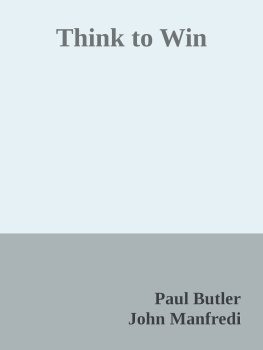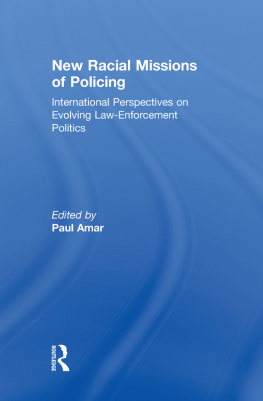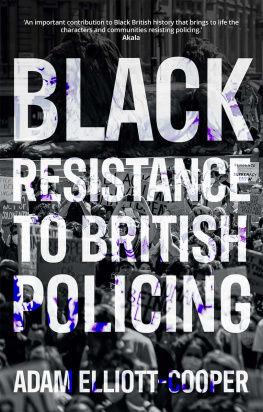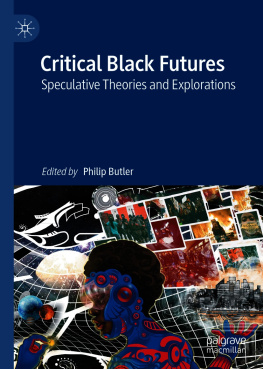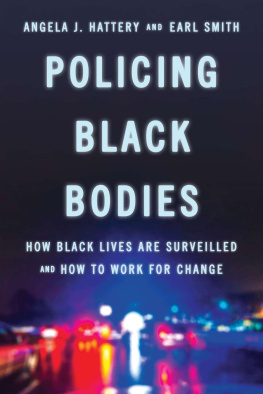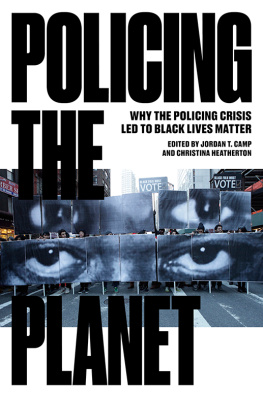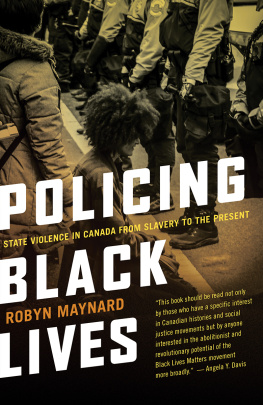Paul Butler - Chokehold - Policing Black Men
Here you can read online Paul Butler - Chokehold - Policing Black Men full text of the book (entire story) in english for free. Download pdf and epub, get meaning, cover and reviews about this ebook. year: 2017, publisher: The New Press, genre: Politics. Description of the work, (preface) as well as reviews are available. Best literature library LitArk.com created for fans of good reading and offers a wide selection of genres:
Romance novel
Science fiction
Adventure
Detective
Science
History
Home and family
Prose
Art
Politics
Computer
Non-fiction
Religion
Business
Children
Humor
Choose a favorite category and find really read worthwhile books. Enjoy immersion in the world of imagination, feel the emotions of the characters or learn something new for yourself, make an fascinating discovery.

- Book:Chokehold - Policing Black Men
- Author:
- Publisher:The New Press
- Genre:
- Year:2017
- Rating:4 / 5
- Favourites:Add to favourites
- Your mark:
- 80
- 1
- 2
- 3
- 4
- 5
Chokehold - Policing Black Men: summary, description and annotation
We offer to read an annotation, description, summary or preface (depends on what the author of the book "Chokehold - Policing Black Men" wrote himself). If you haven't found the necessary information about the book — write in the comments, we will try to find it.
Chokehold - Policing Black Men — read online for free the complete book (whole text) full work
Below is the text of the book, divided by pages. System saving the place of the last page read, allows you to conveniently read the book "Chokehold - Policing Black Men" online for free, without having to search again every time where you left off. Put a bookmark, and you can go to the page where you finished reading at any time.
Font size:
Interval:
Bookmark:
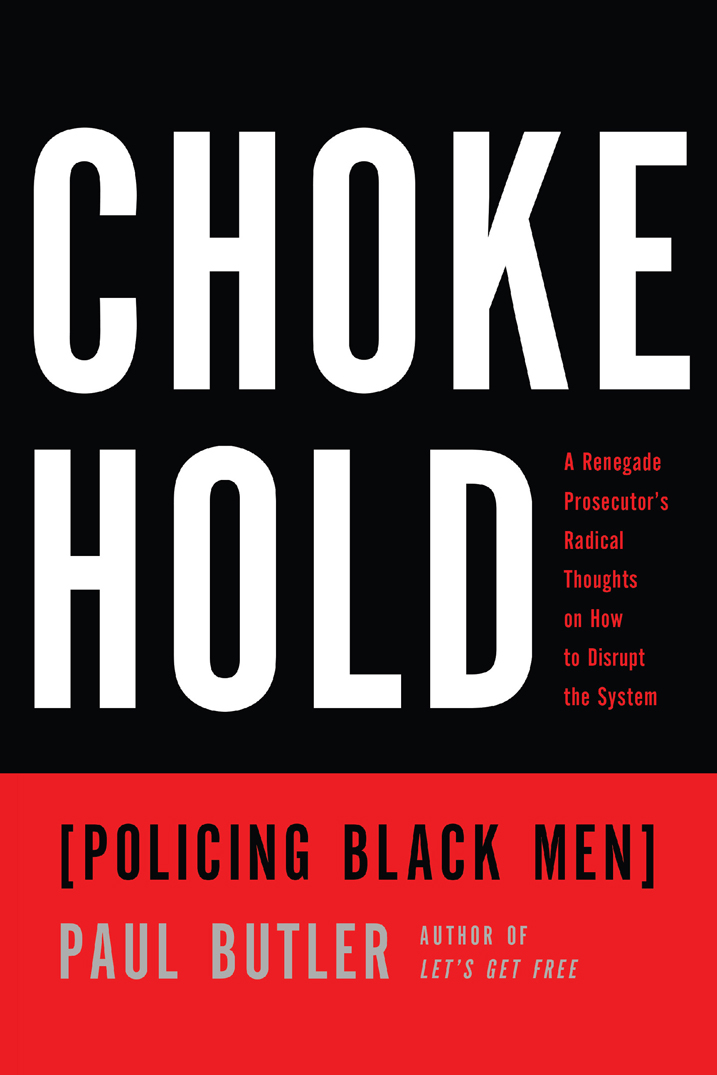

This book has been a long time coming. It started out, several years ago, as a guide to the criminal justice system for African American men, but then Trayvon Martin was killed. A guide to the criminal justice system would not have saved Trayvon; he was shot down just walking home from the store after buying some candy. Then came Michael Brown, also walking in the street; Sandra Bland, driving her car; Eric Garner, allegedly selling cigarettes on the street corner; and Freddie Gray, minding his own business in his own neighborhood, to name only a few of the black people who were killed for no reason and treated in life and death more like criminals than the people who killed themnot one of whom has gone to prison. The movement that rose up to avenge their deaths inspired me. In the language of the movement for black lives, I got woke. Chokehold is the result. More than anything I hope Chokehold honors the lives of those fallen sisters and brothers and advances the project to mark their deaths as the start of a revolution.
It takes a posse to write a book. I am fortunate to belong to a few. Chokehold was nurtured at the African American Policy Forums Social Justice Writers Workshop, an annual gathering of race women and men in Negril, Jamaica. We eat ackee and codfish, write, read each others work, meet in the Atlantic Ocean for two hours to workshop papers, and eat jerk chicken. Deepest gratitude to Kimberl Crenshaw, Luke Harris, and Devon Carbado for creating and sustaining this beloved community. They made Chokehold a better book, along with the others who joined us in the ocean, including Sahar Aziz, Khaled Beydoun, Laura Flanders, Marcus Hunter, Kiese Laymon, George Lipsitz, Darnell Moore, Priscilla Ocen, Marlon Peterson, Andrea Richie, and Alvin Starks.
The men of Positive Change, at Marylands Jessup Correctional Institution, blessed me with an insightful reading of the entire manuscript. Much respect, my brothers, and stay strong.
The Criminal Justice Roundtable is a yearly gathering of some incredible criminal law scholars. What a privilege to present chapters to the group in meetings at Harvard and Stanford. Shout-out to Tracey Meares, Carol Steiker, and David Sklansky for the opportunity, and to the members of the roundtable for the amazing feedback.
The John Mercer Langston Conference is a formation of black male law professors and those brothers were some of my best, and toughest, critics. High fives to all the participants in my workshop, especially Mario Barnes, Charlton Copeland, and Terry Smith.
In addition to the posses, cash money and time off from the 95 gig helped Chokehold get done. Georgetown University Law Center, my wonderful academic home, provided a sabbatical and summer research grants. Dean Bill Treanor always has my back.
Mad props to my friends and colleagues who commented on draft chapters. I shared my stuff with these folks because they are some of the smartest and most generous people I know, and I got way better than I gave. Thank you to Amna Akbar, Sharon Dolovich, Jeff Fagan, Katherine Franke, Justin Hansford, Bernard Harcourt, Kris Henning, Eisha Jain, Corinna Lain, Adam Levitin, Judith Lichtenberg, David Luban, Scott McAbbe, Allegra McLeod, Tracey Meares, Sherally Munshi, Gary Peller, Catherine Powell, Andrea Roth, Stephen Rushin, Michael Seidman, Ted Shaw, Abbe Smith, Gerry Spann, Carol Steiker, Peter Tague, Kendall Thomas, Deborah Tuerkheimer, Robin West, and Patricia Williams.
My research assistants are the best. Alexander Galicki, Eric Glatt, Bradford Ham, Suraj Kumar, Will McAuliffe, Sonia Tabriz, Daniel Walsh, Chase Whiting, and Edward Williams all went beyond the call of duty. Georgetown Law students Jessica Lyn Davis, Garrett Thomas, and Adi Williams also made contributions, as did Monica Martinez, my faculty assistant.
Big up to the peeps who generously shared their ideas, experiences, and encouragement, especially Deleso Alford, Alvaro Bedoya, Donovan Chamberlayne, Angela Jordan Davis, Tamara Lawson, Eric Lotke, and Robert Patterson. The Raben Group has been an invaluable partner in introducing Chokehold to the world. Robert Raben and Donald Gatlin are my top dawgs.
I presented works in progress of various chapters at the University of Alabama School of Law, Arizona State Universitys Sandra Day OConnor College of Law, University of Florida Levin College of Law, Fordham Law School, Georgetown University Law Center, George Washington University Law School, and the University of Richmond School of Law. Many thanks to the participants in those sessions.
The New Press is the publisher a writer dreams of. Sometimes it seemed as if Diane Wachtell and Ellen Adler believed in this project even more than I did. I am grateful to everyone at The New Press for their support and their diligent work on Chokehold, and to Diane and Jed Bickman for their superb editing.
My friends gave me hugs and bought me drinks, offered tough love when I needed it (and a few times when I really didnt), and showed so much support. Paul McPherson, Mark Brown, Jayne Jerkins, Dana Lintz, Scott McAbbe, Brenda Morris, Uche Onwuamaegbu, Ron Ross, Myron Smith, Mark Srere, and Verna Williamsthank you for the love.
My mother, Lindi Butler-Walton, is my biggest supporter, followed by my sister Kimberly Butler. Every page of this book is a product of the love they have shown me all my life. Jonell Nash, my fathers partner, and Elmo Walt Walton, my mothers husband, both made their transitions as I worked on this book. They supported my work and, more importantly, loved my parents fiercely, and I know that, in the great beyond, they are still taking good care of us.
My father, the actor Paul Butler, used his art to show the world the joy and pain of being a black man in the United States of America. Daddy was a race man through and through. He loved black people and believed in us and he loved me and believed in me. This book is dedicated to him.
ALSO BY PAUL BUTLER
Lets Get Free: A Hip-Hop Theory of Justice
ABOUT THE AUTHOR
A former federal prosecutor, Paul Butler provides legal commentary for MSNBC, CNN, and NPR and writes for the New York Times and the Washington Post. A law professor at Georgetown University, he is the author of Lets Get Free: A Hip-Hop Theory of Justice (The New Press) and lives in Washington, D.C.
Celebrating 25 Years of Independent Publishing
Thank you for reading this book published by The New Press. The New Press is a nonprofit, public interest publisher celebrating its twenty-fifth anniversary in 2017. New Press books and authors play a crucial role in sparking conversations about the key political and social issues of our day.
We hope you enjoyed this book and that you will stay in touch with The New Press. Here are a few ways to stay up to date with our books, events, and the issues we cover:
Sign up at www.thenewpress.com/subscribe to receive updates on New Press authors and issues and to be notified about local events
Like us on Facebook: www.facebook.com/newpressbooks
Follow us on Twitter: www.twitter.com/thenewpress
Please consider buying New Press books for yourself; for friends and family; and to donate to schools, libraries, community centers, prison libraries, and other organizations involved with the issues our authors write about.
The New Press is a 501(c)(3) nonprofit organization. You can also support our work with a tax-deductible gift by visiting www.thenewpress.com/donate.
Font size:
Interval:
Bookmark:
Similar books «Chokehold - Policing Black Men»
Look at similar books to Chokehold - Policing Black Men. We have selected literature similar in name and meaning in the hope of providing readers with more options to find new, interesting, not yet read works.
Discussion, reviews of the book Chokehold - Policing Black Men and just readers' own opinions. Leave your comments, write what you think about the work, its meaning or the main characters. Specify what exactly you liked and what you didn't like, and why you think so.

